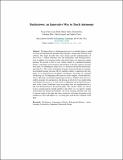Duckietown: An Innovative Way to Teach Autonomy
Author(s)
Tani, Jacopo; Paull, Liam; Zuber, Maria; Rus, Daniela L; How, Jonathan P; Leonard, John J; Censi, Andrea; ... Show more Show less
DownloadRus_Duckietown.pdf (347.3Kb)
OPEN_ACCESS_POLICY
Open Access Policy
Creative Commons Attribution-Noncommercial-Share Alike
Terms of use
Metadata
Show full item recordAbstract
Teaching robotics is challenging because it is a multidisciplinary, rapidly evolving and experimental discipline that integrates cutting-edge hardware and software. This paper describes the course design and first implementation of Duckietown, a vehicle autonomy class that experiments with teaching innovations in addition to leveraging modern educational theory for improving student learning. We provide a robot to every student, thanks to a minimalist platform design, to maximize active learning; and introduce a role-play aspect to increase team spirit, by modeling the entire class as a fictional start-up (Duckietown Engineering Co.). The course formulation leverages backward design by formalizing intended learning outcomes (ILOs) enabling students to appreciate the challenges of: (a) heterogeneous disciplines converging in the design of a minimal self-driving car, (b) integrating subsystems to create complex system behaviors, and (c) allocating constrained computational resources. Students learn how to assemble, program, test and operate a self-driving car (Duckiebot) in a model urban environment (Duckietown), as well as how to implement and document new features in the system. Traditional course assessment tools are complemented by a full scale demonstration to the general public. The “duckie” theme was chosen to give a gender-neutral, friendly identity to the robots so as to improve student involvement and outreach possibilities. All of the teaching materials and code is released online in the hope that other institutions will adopt the platform and continue to evolve and improve it, so to keep pace with the fast evolution of the field.
Date issued
2017-08-29Department
Massachusetts Institute of Technology. Computer Science and Artificial Intelligence Laboratory; Massachusetts Institute of Technology. Department of Earth, Atmospheric, and Planetary Sciences; Massachusetts Institute of Technology. Department of Mechanical Engineering; Massachusetts Institute of Technology. Laboratory for Information and Decision SystemsJournal
Advances in Intelligent Systems and Computing
Publisher
Springer Cham
Citation
Tani, Jacopo et al. “Duckietown: An Innovative Way to Teach Autonomy.” Alimisis D., Moro M. and Menegatti E., editors. Educational Robotics in the Makers Era. Edurobotics 2016. Advances in Intelligent Systems and Computing 560 (2017): 104–121 © Springer International Publishing AG 2017
Version: Author's final manuscript
ISBN
978-3-319-55552-2
978-3-319-55553-9
ISSN
2194-5357
2194-5365